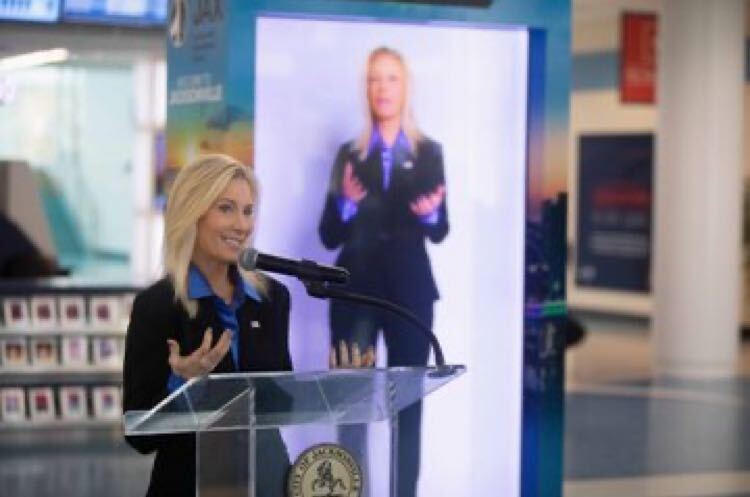With just days to go before a municipal budget must be passed, state officials are squawking about what they see as profligate spending in Jacksonville.
CFO Blaise Ingoglia told reporters on the Southside that Democratic Mayor Donna Deegan’s administration was devoting big bucks to questionable priorities. He said the budget, proposed to be $2 billion for the upcoming fiscal year, could be 10% leaner at least, with a haircut on property taxes to match.
Ingoglia’s Office, via the Florida Department of Government Efficiency initiative, took a look at Jacksonville’s books this Summer. The Spring Hill Republican offered a predictably scathing review, with a joke to start.
“I considered doing this presentation as a hologram. But I wanted to save taxpayers’ dollars,” Ingoglia quipped, citing a personal branding initiative of the Mayor that greets air travelers.
But the larger point was no joke at all. Rather, Ingoglia offered a “high-level” attempt to “illustrate how big government has gotten in the city of Jacksonville and how spending has gotten out of hand” in the city with a supermajority Republican City Council.
Ingoglia said property taxes have “skyrocketed” and that people “demand relief,” a timely declaration given that Council members who want a 1/8 mill cut were on hand Wednesday.
“Local governments are taking that money, expanding government, paying people in the bureaucracy some pretty big raises,” Ingoglia said.
Jacksonville, said Ingoglia, is “overtaxing and overspending … to the tune of almost $200 million.”
The problem didn’t start with Deegan’s election.
He said “big-government apologists” can “deflect,” but over the last five years, four of which were under Republican Mayor Lenny Curry, the overage could be as high as the “$230-$240 million range … excessive and definitely wasteful.”
Yet while big spending is a “Republican and Democratic problem,” Ingoglia says Deegan’s spending is on “steroids.”
Since Fiscal Year 2019-20, Ingoglia said the General Fund budget is up more than 50%, “an astounding number” that “outstrips wage and population growth” for a population increase of under 57,000 people, equating to $12,000-plus per person, with 646 city employees hired, or one for every 88 new residents.
“Those are obnoxious numbers,” Ingoglia said.
Salaries for city workers are up nearly 24% over the last four years, a number boosted by raises for first responders among others.
All told, Ingoglia believes property tax can be cut by 1.19 million (much more than the 1/8 mill the City Council wants to cut), and the city wouldn’t have to “skip a beat” in cutting the “reckless, bloated budget.”
Ahead of Ingoglia’s press conference, Gov. Ron DeSantis said the city had room to cut as well, and likewise couldn’t resist Deegan’s doppelganger as an example of fiscal waste.
“I do know they spent tens of thousands of dollars to create a hologram of the Mayor to put at Jacksonville International Airport. Do you want to pay property taxes to fund that? I mean, probably not, I think most people would say,” the Governor said in Apalachicola.
Jacksonville’s fiscal picture indeed is bleak.
Truth in Accounting reported a per capita debt of nearly $10,000 for every person in the city, which puts Jacksonville 60th out of 75 cities ranked.
But without property taxes, it could be worse.
“Public safety expenses, which account for 53% of total governmental costs, rose by $418.1 million adding financial strain. Property taxes, the largest revenue source, remain crucial to Jacksonville’s fiscal health.”
As Redfin notes, Jacksonville property taxes went up 60% between 2019 and 2024, roughly double the country’s overall rate of increase during the same five-year period.
But that money doesn’t defray debt, legacy costs, or questionable decisions forged in bipartisan consensus.
Pension problems are also an issue. The Tributary notes that the Police and Fire Pension Fund is $3 billion in debt and is just 44% funded. As of 2023, the General Employees’ Pension Fund was nearly $1.4 billion in debt.
Additionally, the city is moving to put police and fire in the Florida Retirement System, which could add more than $26.5 million a year to outflows starting in two years.
But there’s also stadium spending.
The Mayor and the Council agreed to devote five years of a half-cent sales tax which was slated to be repurposed to retiring that legacy defined benefit pension debt, with the city pleading with Tallahassee to allow that back in 2017, to going in 50/50 with multibillionaire Shad Khan in renovating the Jaguars’ stadium, at a cost of $775 million to taxpayers.
“The stadium and all that funding is a discussion the administration needs to have with policymakers,” Ingoglia said, dodging a reporter’s question.
While Ingoglia says his math accounts for first responder raises, public safety splashes are a big part of the problem in the city.
Deegan declined an interview request, but defended her “smart, responsible budget” in a prepared statement, noting that the city has “the lowest property tax rate of any major city in Florida” and saying Ingoglia “largely ignored the reasons for growth.”
“Our fiscal responsibility is recognized by the leading ratings agencies, and our investments in public safety and infrastructure are creating a high quality of life, which is the reason we have the fastest growing population in Florida. Our police and fire unions, business community, and working families across the city all agree that Jacksonville’s millage rate should remain where it is, so that we can continue to invest in our people.”
Ingoglia will be at City Hall again Thursday, Deegan said, and she would like to meet with him. Last time she offered, the request was rejected though.
Post Views: 0


